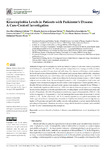Kinesiophobia Levels in Patients with Parkinson’s Disease: A Case-Control Investigation

Use this link to cite
http://hdl.handle.net/2183/27967
Except where otherwise noted, this item's license is described as Atribución 4.0 Internacional (CC BY)
Collections
- Investigación (FCS) [1293]
Metadata
Show full item recordTitle
Kinesiophobia Levels in Patients with Parkinson’s Disease: A Case-Control InvestigationAuthor(s)
Date
2021-04-30Citation
Jiménez-Cebrián, A.M.; Becerro-de-Bengoa-Vallejo, R.; Losa-Iglesias, M.E.; de Labra, C.; Calvo-Lobo, C.; Palomo-López, P.; Martínez-Jiménez, E.M.; Navarro-Flores, E. Kinesiophobia Levels in Patients with Parkinson’s Disease: A Case-Control Investigation. Int. J. Environ. Res. Public Health 2021, 18, 4791. https://doi.org/10.3390/ijerph18094791
Abstract
[Abstract]
Background: Kinesiophobia can be an obstacle to physical and motor activity in patients with Parkinson’s disease (PD). PD affects patients’ independence in carrying out daily activities. It also impacts a patient’s biopsychosocial well-being. The objective of this study was to analyze the levels and scores of kinesiophobia in PD patients and compare them with healthy volunteers. Methods: We deployed a case-control study and recruited 124 subjects (mean age 69.18 ± 9.12). PD patients were recruited from a center of excellence for Parkinson’s disease (cases n = 62). Control subjects were recruited from the same hospital (control n = 62). Kinesiophobia total scores and categories were self-reported using the Spanish version of the Tampa Scale of Kinesiophobia (TSK-11). Results: Differences between cases and control groups were analyzed using the Mann–Whitney U test. Statistically significant differences (p < 0.05) were shown between groups when comparing kinesiophobia categories (or levels) and total scores, revealing higher kinesiophobia symptoms and levels in PD patients. All of the PD patients reported some degree of kinesiophobia (TSK-11 ≥ 18), while the majority of PD patients (77.3%) had kinesiophobia scores rated as moderate to severe (TSK-11 ≥ 25). On the other hand, ~45.1% of controls reported no or slight kinesiophobia and 53.2% reported moderate kinesiophobia. Conclusions: Total kinesiophobia scores were significantly higher in PD patients compared with healthy controls, with moderate to severe kinesiophobia levels prevailing in PD patients. Therefore, individuals living with PD should be evaluated and controlled in order to detect initial kinesiophobia symptoms.
Keywords
Movement disorders
Parkinson’s disease
Musculoskeletal and neural physiological phenomena
Parkinson’s disease
Musculoskeletal and neural physiological phenomena
Editor version
Rights
Atribución 4.0 Internacional (CC BY)
ISSN
1660-4601






